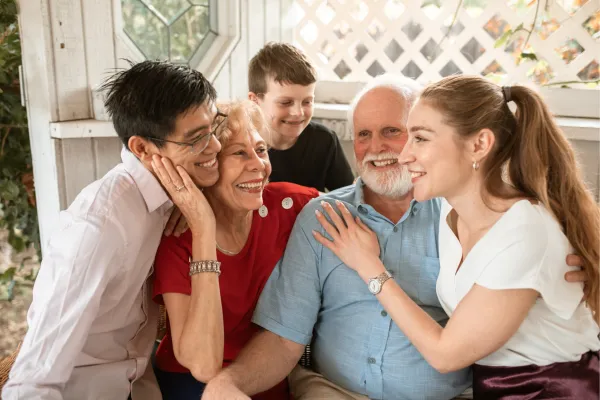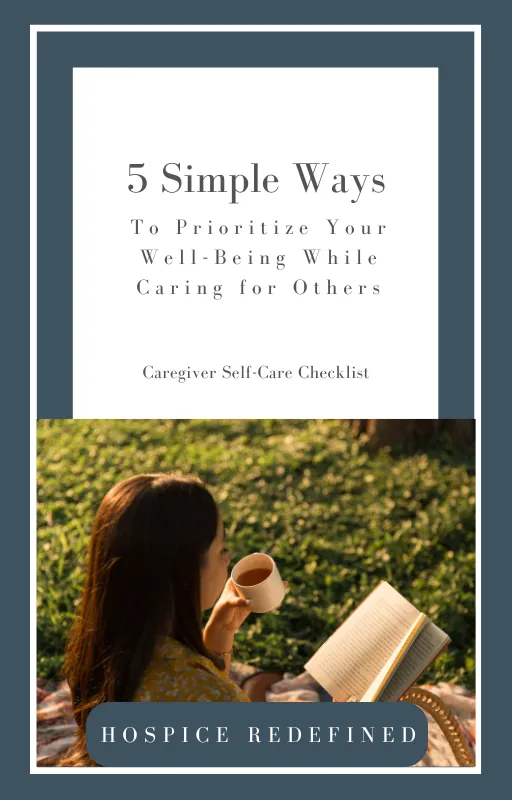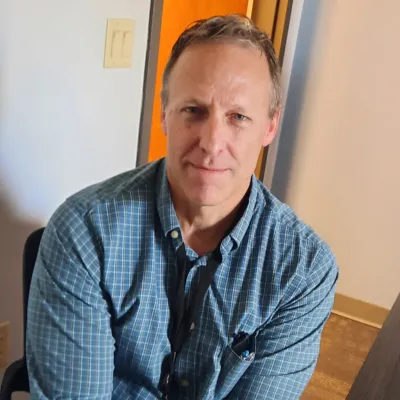HOSPICE REDEFINED PODCAST

Redefined
Hospice
Your Guide to Understanding Hospice With Clarity and Compassion

Hospice
Redefined
Your Guide to Understanding Hospice With Clarity and Compassion

Navigating Family Dynamics During Hospice Care
“All families have issues. If someone says, ‘Everything’s perfect,’ I have to smile. Every family brings its own dynamics.” - John Myers, MSW
🎧 Listen on Apple Podcasts | Listen on Spotify
Navigating Family Dynamics During Hospice Care
When a loved one enters hospice care, families often find themselves navigating a whirlwind of emotions, decisions, and responsibilities. This time can be deeply meaningful—but it can also bring to the surface old wounds, complicated relationships, and conflicting opinions about what’s best for the person they love.
As a hospice nurse, I’ve seen firsthand how family dynamics can shape the end-of-life journey. And while every family is unique, there are common challenges and patterns that often emerge.
This post and the podcast episode above explores why family dynamics matter so much during hospice care, why they can be difficult, and how caregivers can navigate them with greater compassion and understanding.
Why Family Dynamics Can Be So Challenging
When someone is approaching the end of life, family members naturally want to rally around them. But each person comes to the situation with their own history, personality, and worldview. Even siblings who grew up in the same home may hold vastly different opinions and values.
This can lead to tension. One family member might want every possible intervention, while another may feel strongly about prioritizing comfort. Some may cope by diving into tasks; others may avoid being present because it’s too painful.
It’s important to remember: this doesn’t mean anyone loves the patient more or less. It simply reflects the fact that every relationship—and every person’s way of coping—is unique.
The Caregiver Role Changes Everything
One of the biggest stressors families face is the shift in roles that happens when someone becomes a primary caregiver. This often happens with spouses. Couples who have spent decades in a certain rhythm of life suddenly find themselves together 24/7.
Patients often struggle with the loss of independence and may feel like a burden. Spouses, meanwhile, are juggling exhaustion, household responsibilities, and the emotional toll of seeing their partner decline.
This combination can lead to frustration and guilt. But these feelings are normal. Recognizing this can help caregivers be gentler with themselves—and with each other.
Why Listening Matters More Than Fixing
In moments of stress, it’s human nature to want to “fix” problems. But during hospice care, there often isn’t a simple fix. One of the most powerful things you can do for a loved one—or another family member—is to truly listen.
That means listening without judgment, without jumping in to offer advice, and without trying to solve what can’t be solved. Simply being present can provide incredible relief.
Caregivers sometimes find this especially hard when other family members, particularly those who live farther away, swoop in and offer opinions without understanding the full picture. In these moments, it can help to remind yourself: advice is often an attempt to feel useful. Redirecting that energy into listening and supporting can defuse tension.
Complicated Relationships Don’t Disappear
Hospice care often intensifies existing family dynamics. If a relationship with the patient was strained before, those emotions may resurface.
This doesn’t mean you don’t care about your loved one—it simply means your relationship has its own history. Allow space for those emotions, even the hard ones like resentment, anger, or regret. Suppressing them often leads to more tension later.
The same is true for grief. Each person grieves differently because each relationship was different. Understanding this can help family members extend grace to one another.
The Power of Honest Communication
During hospice care, honesty can feel intimidating, but it’s essential. Patients sometimes hide symptoms to protect loved ones. Family members may avoid conversations because they fear upsetting others.
But unspoken truths can lead to untreated pain, missed opportunities, and lingering resentment.
Be willing to talk about what’s really happening—even when it’s uncomfortable. Share what you need, how you’re feeling, and what’s most important to you. And if you’re the primary caregiver, ask for help clearly. Many caregivers struggle because they expect family members to “just know” what they need. The reality is, they often don’t.
Death Is a Part of Life
One of the reasons these conversations feel so hard is because our culture rarely talks openly about death. But death is an inevitable part of life.
When families can face that truth together—gently, compassionately, and without avoidance—it can transform the end-of-life experience. Patients often know when their time is short, even if they don’t say it out loud. Acknowledging that reality can bring peace and deeper connection.
Key Reminders for Families
If you’re caring for a loved one in hospice, here are a few takeaways to keep in mind:
Expect complicated emotions. Feelings like anger, guilt, and relief are normal.
Listen more than you speak. Presence matters more than advice.
Be clear about your needs. Don’t expect others to read your mind.
Accept that relationships shape experiences. Every family member will cope differently.
Have the hard conversations. Honest communication leads to better care and less regret.
You’re Not Alone
Hospice care can be one of the most challenging chapters a family ever faces. But it can also be one of the most meaningful.
If you’re struggling with the family dynamics surrounding your loved one’s care, know that you don’t have to navigate it alone. Hospice teams—nurses, social workers, spiritual caregivers, aides—are there to support you too.
Leaning on your care team, trusted friends, or caregiver support groups can make the journey more bearable. And in doing so, you’ll create the space for your loved one’s final days to be filled with comfort, dignity, and connection.
Final Thought
Family life is never simple, and neither is end-of-life care. But when we lean into honesty, compassion, and listening, we can honor our loved one’s life and find healing—even in the midst of heartbreak.
💛 Want More Support?
Visit HospiceRedefined.com to grab your free Caregiver Self-Care Checklist—a PDF you can print and put on your fridge to remind you of the small things that make a big difference.
🎧 Listen to this episode on your favorite podcast platform:
And if you found this episode helpful, please forward it to someone who needs it. Or better yet, grab your phone, press play, and sit with them while they listen.
You’re not alone. We’re so proud of you for showing up.
Until next time,
Rachel Carta, RN
Host of Hospice Redefined
Written and produced by Rachel Carta, RN, Functional Nutrition Counselor & Life Coach. This episode features an interview with John Myers, MSW.

Rachel Carta
Rachel Carta is a registered nurse with extensive experience in hospice care, a functional nutrition counselor, and a life coach. As the host of the Hospice Redefined podcast, she is passionate about shifting the misconceptions surrounding hospice and empowering caregivers, families, and healthcare professionals with knowledge and compassionate support. Rachel’s mission is to help people see hospice not as an ending, but as an opportunity to bring comfort, dignity, and meaningful connection during life’s most profound transitions.
Listen
Episode 1:
Episode Title Goes Here
Episode 2:
Episode Title Goes Here
Episode 3:
Episode Title Goes Here
YOUR WELL-BEING MATTERS TOO
5 Simple Ways to Prioritize Your Well-Being
While Caring for Others
Click below to get instant access to the Caregiver Self-Care Checklist.


Your Host
Rachel is a hospice nurse, functional nutrition counselor, and life coach. As host of Hospice Redefined, she’s passionate about dispelling hospice misconceptions and empowering caregivers with knowledge and support. Her mission is to help families see hospice as an opportunity for comfort, dignity, and meaningful connection.
Rachel Carta, RN
HOST OF HOSPICE REDEFINED, AUTHOR, SPEAKER
SELINSGROVE, PA

Special Recurring Contributor
John is a social worker with more than 30 years of experience. He brings a wealth of knowledge, compassion, and empathy to our listeners.
John Myers, MSW
SOCIAL WORKER


Discover 12 Steps to heal and manifest an empowered life
Download A Free Chapter From My Number One Bestselling Book "Secrets to authentic happiness"

Transformational!
Occasionally in life you come across something truly transformational. Rachel Carta’s “Secrets to Authentic Happiness” is just that. Rachel weaves touching stories of her own life and experiences along with industry studies to describe and reveal how our thoughts and perspective make all the difference. An amazing read!
- Joyce W.
The Hospice Redefined site is managed by:

Connect with us:
© 2025 All Rights Reserved | HOSPICE REDEFINED
PRIVACY POLICY | Terms and Condition
Custom Crafted By ExpertSites


